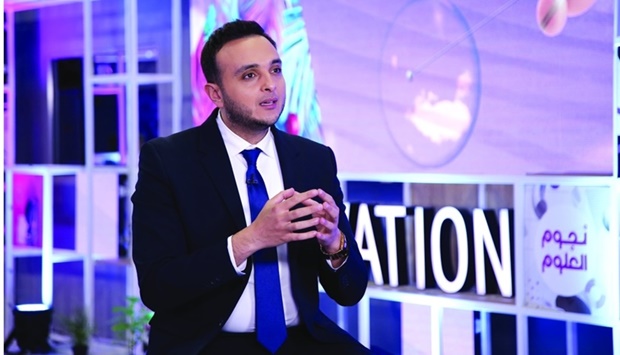Since winning the top prize on Stars of Science (SoS) in 2018 with his life-saving portable device that provides early warning of the possibility of a stroke, Dr Walid Albanna, the young neurosurgeon and renowned researcher from Palestine, has made it his mission to encourage aspiring scientists to follow their curiosity.
He has continued to be closely involved with SoS, an edutainment TV show by Qatar Foundation, returning as co-host in 2019 before joining the highly regarded jury in Season 13 last year, drawing on his first-hand experience of winning the show to guide and motivate competitors.
He has garnered a devoted international following by posting videos on his YouTube channel covering several topics such as study tips, treating patients for loss of smell and taste after Covid-19 infection among others.
As Season 14 of the competition introduces a fresh wave of aspiring science and technology entrepreneurs vying to gain recognition for their inventions, Dr Albanna reflects on his own journey from a contestant to judge and the dawn of a new era of innovation in the Arab world.
“It has been a really good experience to go through various roles with SoS. I would probably have seen the role of a juror as extremely difficult if I hadn't been an SoS candidate beforehand. At the start of Season 13, I found the concept of having two juries quite a challenge. It was also incredible how many ideas we evaluated, and the diversity of the topics we dealt with. Overall, I loved being a judge. I still need experience, but that will undoubtedly come with time,” he said.
Dr Albanna says that the good thing about SoS is that it reinvents itself every year. “I was very impressed by the number of female participants in Season 13 – and I hope that number doubles. May be SoS 14 will have a female winner,” he noted.
He explained: “SoS not only turns ideas into reality; it also reinforces your personality. It’s not just about winning a prize, but about the unique experience of undergoing an intensive learning curve in a very short period of time. You have to be patient and you have to learn how to work in a team. Success never comes from just one person.”
According to Dr Albanna, one of the main issues has been a lack of essential structure or organisation to nurture young talent. “Qatar Foundation recognised this problem early on and has been working for many years to help remedy it. I think younger generations are now more focused on scientific careers, and I expect to see many more young innovators emerge from this part of the world,” he remarked.
“I used to be locked in a niche, only focused on neurosurgery and science. As a result of my ongoing involvement with SoS, I have expanded my contacts with people from areas outside of medicine. SoS has developed me further. The world of innovation is simply brilliant,” he added.
He has continued to be closely involved with SoS, an edutainment TV show by Qatar Foundation, returning as co-host in 2019 before joining the highly regarded jury in Season 13 last year, drawing on his first-hand experience of winning the show to guide and motivate competitors.
He has garnered a devoted international following by posting videos on his YouTube channel covering several topics such as study tips, treating patients for loss of smell and taste after Covid-19 infection among others.
As Season 14 of the competition introduces a fresh wave of aspiring science and technology entrepreneurs vying to gain recognition for their inventions, Dr Albanna reflects on his own journey from a contestant to judge and the dawn of a new era of innovation in the Arab world.
“It has been a really good experience to go through various roles with SoS. I would probably have seen the role of a juror as extremely difficult if I hadn't been an SoS candidate beforehand. At the start of Season 13, I found the concept of having two juries quite a challenge. It was also incredible how many ideas we evaluated, and the diversity of the topics we dealt with. Overall, I loved being a judge. I still need experience, but that will undoubtedly come with time,” he said.
Dr Albanna says that the good thing about SoS is that it reinvents itself every year. “I was very impressed by the number of female participants in Season 13 – and I hope that number doubles. May be SoS 14 will have a female winner,” he noted.
He explained: “SoS not only turns ideas into reality; it also reinforces your personality. It’s not just about winning a prize, but about the unique experience of undergoing an intensive learning curve in a very short period of time. You have to be patient and you have to learn how to work in a team. Success never comes from just one person.”
According to Dr Albanna, one of the main issues has been a lack of essential structure or organisation to nurture young talent. “Qatar Foundation recognised this problem early on and has been working for many years to help remedy it. I think younger generations are now more focused on scientific careers, and I expect to see many more young innovators emerge from this part of the world,” he remarked.
“I used to be locked in a niche, only focused on neurosurgery and science. As a result of my ongoing involvement with SoS, I have expanded my contacts with people from areas outside of medicine. SoS has developed me further. The world of innovation is simply brilliant,” he added.


